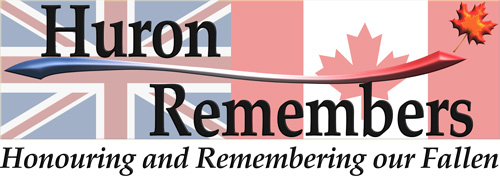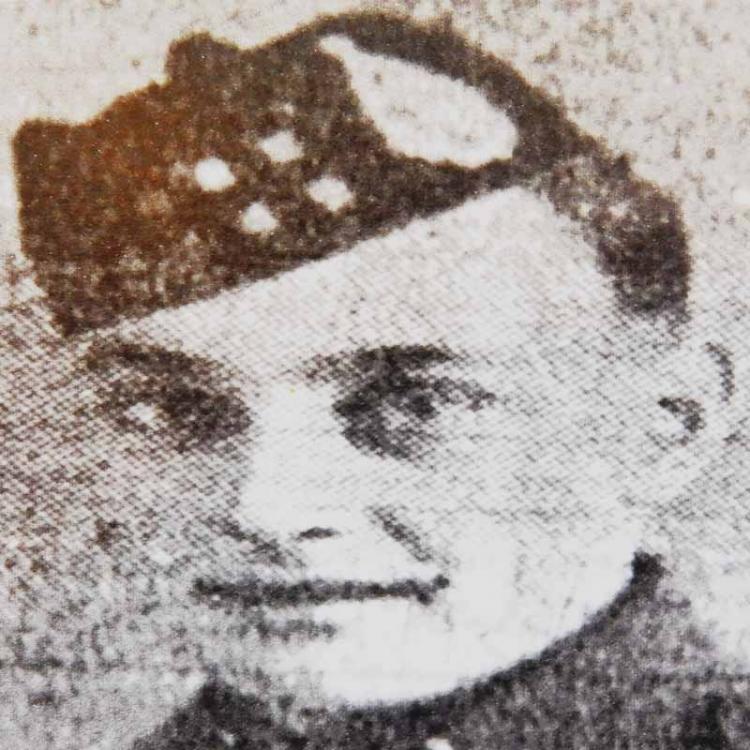DUCKWORTH, William de Long
NAME DUCKWORTH William de Long RANK Private A/22158 1st Canadian Army - 2nd Canadian Infantry Division - 4th Canadian Infantry Brigade REGIMENT Essex Scottish Regiment - 1st Battalion "always ready" Royal Canadian Infantry Corps Residence: Goderich - Ontario Birth: August 6, 1920 - Goderich - Township of Goderich - County of Huron - Ontario Died: November 14, 1942 22 years 3 months Cemetary: Grosbeek Canadian War Cemetery - Groesbeek - Gelderland - Netherlands XII D 2
Parents: Mr. Wallace and Ila Duckworth - Goderich - Ontario
Brothers: Harold was serving overseas in the Canadian Army Redford was with the RCAF serving in Alaska John was in Halifax in the Royal Canadian Navy.
Sisters: Wanda, Marion, Joanne and Margaret were all in Goderich - Ontario
William was born on August 6, 1920 and he grew up on Bayfield Road before the family moved to 27 McDonald Street in Goderich. He and his family attended Knox Presbyterian Church. He was in the Active Militia with the Middlesex and Huron Regiment. He completed one year of high school. He was employed as a Steamboat Fireman on the Lakers out of Goderich and then prior to enlistment as a Grocery Clerk.
Canada
He enlisted into the Canadian Active Service Force on April 18, 1940 in Windsor and upon enlistment he stood 5' 8" tall and weighed 130 pounds. He had a medium complexion with blue eyes and brown hair. Following three months of training he was Struck off Service from the Canadian Army in Canada on July 16, 1940. He then embarked from Canada for overseas. One day later he was Taken on Service with the Canadian Army Overseas
Overseas
Private Duckworth left for overseas on July 16/17, 1940 and arrived in Gourock - Renfrew - Scotland. He was then posted to Camp Aldershot - Aldershot - Hampshire and received disembarkation leave from August 28-September 2, 1940. He is posted to No. 1 Canadian Infantry Holding Unit where his training would continue for the next two years. On October 15, 1941, he was admitted into hospital to have his tonsils removed. One month later he was assigned to No. 1 Convalescent Depot. On November 11th he received 14 days Field Punishment for being AWOL and it is believed from the Convalescent Depot. A week later he was Taken on Service with the Essex Scottish.
Field
On August 18, 1942 the force taking part in "Operation Jubilee" embarked for their mission against the port of Dieppe in France on August 19th. The Essex were part of the main assault on Red beach to the left and this beach was overlooked by 150 - foot high cliffs. The beach itself was flat and exposed as well as being stony and very slippery. The Germans had heavily fortified the area and the garrison was at full strength and on “Alert”.
Immediately after leaving their landing craft the Essex were falling from enemy bullets and explosions. The immediate objective was to find some sort of cover from the Nazi firepower. There were no tanks and the aircraft had left and the Essex had no protection in the 300 - foot run to the base of the cliff. The Germans were sweeping the beaches and the Essex were falling. When the tanks finally arrived, once on the beaches they were disabled by the slippery and rocky terrain as well as from the German fire. The Essex sent in 553 men and only 50 men returned to England. The remainder were killed (121) or captured (382) and close to 600 Canadians were wounded. Approximately 5,000 Canadians landed on those beaches and by early afternoon 900 were dead, 1,000 were wounded, 1,900 were prisoners of war and 2,200 returned to England safely. The feelings of the Canadians then and now is that the High Commands of Canada and Britain had wasted them. They had been ordered onto the beaches in daylight even though their training was done in darkness. Private Duckworth received wounds in the back from grenade splinters. The wounded who could walk on their own walked to the Dieppe hospital and when the hospital became so full the remaining wounded were taken by train to Rouen. In the hospital at Dieppe our Canadians were cared for by the nuns. The majority of the German forces behaved correctly and assisted the Canadian wounded. They acted with respect and dignity. The wounded had their wounds treated and were given morphine and the people of Dieppe were allowed to give our men water and helped care for them. All the wounded were taken to the Hotel-Dieu Hospital and 8 of the most seriously wounded remained on the morning of August 20th. Our Canadian wounded were also looked after by our Canadian medical people. The Canadians were marched out of Dieppe and went through a lot of villages and finally arrived at Envermeau some 14 kilometres from Dieppe and here they were put into a large factory and given black bread and tea. The next day, August 21, they were marched to a place called Verneulles estimated to be about 75 miles from Dieppe toward Paris. This was a holding / interrogation camp. There were wounded in the march who up until this point had not had their wounds tended to and these wounds were now becoming infected. The wounded were taken to the train stations and put on different trains for various German POW camps depending on their rank. The non - wounded were put on various trains as well. Private Duckworth was given a loaf of bread along with water, loaded onto a train around August 24th/25th and began the 400/500 mile journey to Stalag 1X-C. He arrived there on August 27th. From my contact with the International Red Cross, we now know his final destination was Stalag IX located near Bad Sulza which was a town in the Weimarer Land district on the River Ilm. It was also located in the IX German military District. This area was 15 km south-west of the town of Naumberg and 18 km north of Jena. They were located between Erfurt and Leipsig. Stalag 1X-C was the base camp servicing a number of sub-camps spread over a wide area and the majority of the prisoners worked in the salt mines. There was a fairly large hospital called “Reserve-Lazaret Obermassfield” - Grimmenthal and was operated by British, Canadian and New Zealand medical personnel and this is where we believe Private Duckworth was sent following information received from the International Red Cross. The hospital was located in the town of Obermassfield in a three - story stone building. There was 3 one story wood and tar paper barracks that stood in the courtyard to house internal medicine cases and a fourth barrack was used as an isolation ward. The main installation was divided into rooms comprising patient wards, medical officer quarters, two operating rooms, a plaster room, x-ray room, orderly and guard quarters. There was a report by the Swiss Legation in Germany to the British Red Cross Society - London that stated Private Duckworth had received wounds to his back during the Dieppe raid. The wounds he received were in the sacral region with osteomyelitis and that originally his condition was good. He was operated on by Major W. E. Tucker of the Royal Army Medical Corps who removed a large grenade splinter from the wound and then cleaned the wound. Following the operation he ran a high temperature and became extremely anemic. On September 28th, he received a blood transfusion and for a period his condition improved greatly. However, the sepsis from his wound spread internally and he then developed acute peritonitis which required an immediate operation. He came through this procedure well but then a large residual pelvic abscess developed and there were several following operations to clean the abscess and all the while Private Duckworth was getting weaker and was totally exhausted. He then contacted pneumonia and due to his weakened state he could not survive the pneumonia. Private Duckworth died at 3:55 pm on November 14, 1942. His prisoner of War ID was 42916.
Private Duckworth was buried immediately in grave 13 of the Meiningen Cemetery - Thuringia - Germany with full military honours. There was a guard of honour which included 4 Officers, 18 men and a detachment of German soldiers who fired a salute over his grave. Wreaths were laid by the hospital staff, his comrades and by the German Wehrmacht. The coffin was draped in the Union Jack and the Last Post was sounded. The Canadians when they received their Red Cross parcels found such items as tinned salmon or sardines, corned beef and pork luncheon meat. They also received dry biscuits, dried fruits as apples or prunes. Also in their packages were sugar, tea, jam, powdered milk, chocolate, butter, cheese and soap. The Canadian parcels contained 2,070 calories and weighed 11 pounds. By August the Red Cross Parcels averaged one parcel per man per week. It is believed that each man received 75 grams of bread daily and 100 grams of meat per week. Their rations consisted of black bread, (with many saying the main ingredient being sawdust) potatoes, turnips, beets, carrots and marrows often served in soup form (bed board soup), fish cakes, ersatz jam and coffee made from chicory and roasted barley. Bread was the bulk of the daily ration along with a few ounces of pasta, an ounce of cheese and smaller amounts of meat vegetables, olive oil, tomato puree and sugar. The mail system was fair with a letter from England taking about 5 weeks to arrive, and by November the mail was quite regular. The concentration camp and hospital where Private Duckworth died was situated in what would be known as East Germany following the war and he was exhumed and reburied in Berlin Heerstrasse British Cemetery prior to Germany being divided between the Allies. He was exhumed a second time and moved permanently to Groesbeek Canadian War Cemetery in the Netherlands.
In late 1942 his mother Ila received the Memorial Cross. In March of 1950 the family received the medals awarded to Private Duckworth and were the 1939-45 Star, the Defence Medal, the War Medal and the Canadian Volunteer Service Medal.
He is honoured and remembered on the Goderich - Ontario Cenotaph. He is also honoured and remembered on the Memorial panels of the August 19, 1942 Museum in Dieppe - France. He is honoured and remembered on the Memorial Plaque of Knox Presbyterian Church and on the Memorial Plaque of Goderich High School. He is remembered on the Memorial Plaque located on Red Beach in Dieppe - France.


